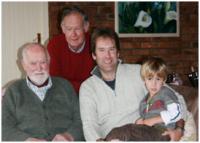Posted on September 16, 2010

My interest in family history started upon the death of my mother, Molly. My father, having given up his home, moved to a smaller home and presented me with 3 tin boxes of family memoirs with included hand written books, family documents, photographs, etc. It also included a family tree researched by the British Museum going back to 1066.
What a bequest! I immediately set about putting together all the known information. Talks with older family members identified at least 95% of the photographs, experts helped me to identify war medals, research into the lives of my forebears revealed some of their successes and failures. I was impatient to talk to older family members and to record their stories. A good lunch with old photographs yielded a mass of stories and gave a wonderful insight into their lives.
This is the story I have put together over the years: my great-grandfather, William Edwards Slingsby (Edwards was his mother's maiden name), spent his early youth in Cape Town with an older brother and sister. His father, Charles Slingsby, was born on 29 April 1812 near Wolverhampton, one of five children born to William and Elizabeth Slingsby of whom only three survived. He married Marianne Edwards in a double ceremony (his older brother William married Anne Frances Edwards) on the 10th August 1847. He, with his wife ran a grocery business in the High Street, Wolverhampton. William Edwards was born on the 18th March 1854. Two days later the family grocer business was placed into liquidation. A handwritten document lists the debts and debtors each with a wax seal embedded with the debtor's personal cygnet ring, displaying their family crests.
Charles's father-in-law, Henry Edwards, a successful importer and exporter in ironmongery, sponsored Charles's ticket to the Cape, there to set up business. Why the Cape? Why not America? Charles seems to have chosen the Cape after Henry's brother John, an English Officer, had come with his regiment to the Cape, and taken part in the capture of the Dutch fleet in Saldanha Bay in 1796 before moving to Ceylon and India. In a letter home to his mother he describes the action and his reward of £250-00, which in those days was a fortune.
Charles, after acquiring premises from which to trade in Darling Street, brought his family to the Cape. Reading the correspondence between the families here and back in England is a heart wrenching affair: goodbyes being taken under the impression they would never meet again. Charles was not a successful businessman and soon found himself in financial difficulties and decided to return to England where he died at the early age of 58 in 1869.
Three sons and three daughters were born of the union. William Edwards Slingsby was the second eldest son. Educated at Oxford, he returned to Cape Town after being offered a teaching or missionary post by William West Jones who was to follow Robert Gray as Archbishop of Cape Town. Posted to St Paul's Church, Rondebosch he taught at the Anglican mission school attached to the Church. During this time he met his future wife Jeannie Isobel Solomon, daughter of Richard Solomon, a merchant in the Cape. Jeannie was brought up by her uncle Saul Solomon (of The Argus & Old Mutual). At the time of their engagement Saul wrote to William congratulating him but noting, "Although it may naturally be a matter of regret to me as well as to yourself that your circumstances are not at present what we might reasonably wish them to be, yet at the same time I hope they may gradually improve".
William and Jane (as she was later known) were married at St Paul's Church, Rondebosch on 31 December 1884. Thereafter they were sent to Mossel Bay where once again he took up a teaching post. He studied to serve the ministry and was ordained as a priest 17 May 1886. He served as Parish Priest in Mossel Bay and Swellendam prior to taking up a position at Stellenbosch in 1896. In 1905 he was appointed as rector of St Francis Church, Simon's Town.
Charles Richard, the only child of William and Jane, was born in Mossel Bay on the 17th May 1887. As a young boy he would travel with his father either on horseback or cape cart to visit the missionary schools and parishioners. He told me how he had to pump the organ with air on Sundays in the church at Swellendam as either the organist could not reach the pedals or was too weak to pump and play at the same time.
While in Stellenbosch, Charles or Copper as he was nicknamed (he was born with a shock of red/auburn hair), joined the British forces at the age of 14 ¾ as a bugler during the Anglo Boer War. Although the town saw no active fighting during the war it boasted the largest detention barracks!
During the wars Copper pioneered short wave radio reception, sitting up all night in his 'radio shack' receiving broadcasts from radio stations in America such as KDKA. Broadcast would be faithfully recorded in his log book. Often newspaper reporters would sit with him and write up world events.He met and married my grandmother, Violet Alice Dove, in a whirlwind romance lasting a week during WW I. They had four children, three of whom are still alive today.
I am in the process of putting the family story together in a book. The book is intended for my family. I have all the documents in my possession at present. They have been sorted into order and stored in a tin box, However, once I have finished with them I would like have them lodged in an acceptable place be it the archives, an old school museum, or any such place.
David Slingsby is the Chairman and Programme Convenor of the Family History Society